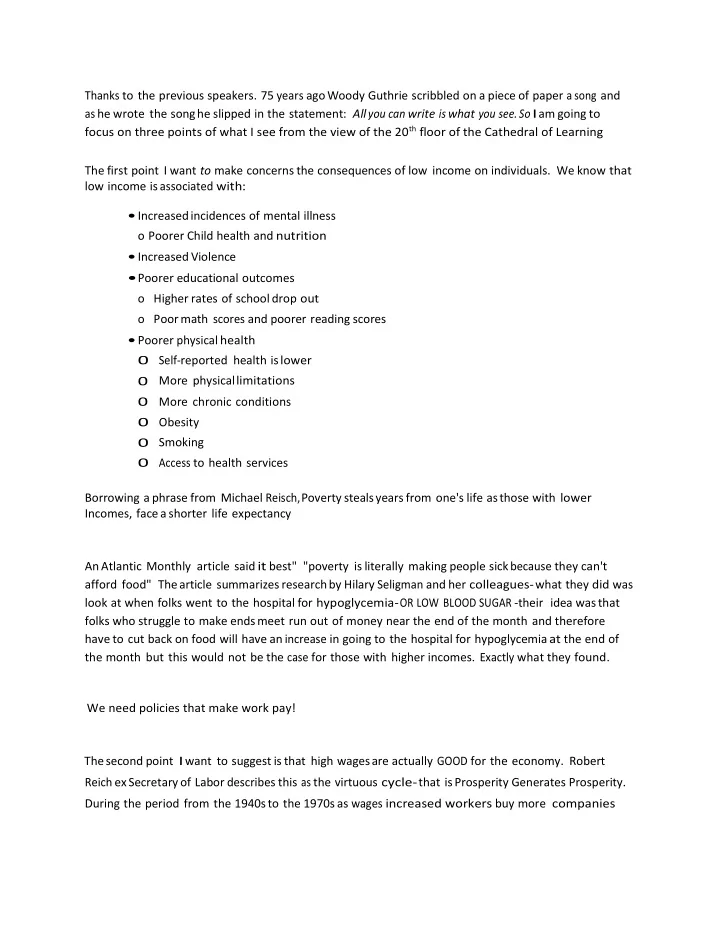

Thanks to the previous speakers. 75 years ago Woody Guthrie scribbled on a piece of paper a song and as he wrote the song he slipped in the statement: All you can write is what you see. So I am going to focus on three points of what I see from the view of the 20 th floor of the Cathedral of Learning The first point I want to make concerns the consequences of low income on individuals. We know that low income is associated with: • Increased incidences of mental illness o Poorer Child health and nutrition • Increased Violence • Poorer educational outcomes o Higher rates of school drop out o Poor math scores and poorer reading scores • Poorer physical health 0 Self- reported health is lower 0 More physical limitations 0 More chronic conditions 0 Obesity 0 Smoking 0 Access to health services Borrowing a phrase from Michael Reisch , Poverty steals years from one's life as those with lower Incomes, face a shorter life expectancy An Atlantic Monthly article said it best" "poverty is literally making people sick because they can't afford food" The article summarizes research by Hilary Seligman and her colleagues- what they did was look at when folks went to the hospital for hypoglycemia- OR LOW BLOOD SUGAR -their idea was that folks who struggle to make ends meet run out of money near the end of the month and therefore have to cut back on food will have an increase in going to the hospital for hypoglycemia at the end of the month but this would not be the case for those with higher incomes. Exactly what they found. We need policies that make work pay! The second point I want to suggest is that high wages are actually GOOD for the economy. Robert Reich ex Secretary of Labor describes this as the virtuous cycle- that is Prosperity Generates Prosperity. During the period from the 1940s to the 1970s as wages increased workers buy more companies
hire more tax revenues increase govt invests more in education and the like workers are better educated (and can compete for better jobs) economy grows productivity grows wages increase. By the 1980s due in part to technology, globalization and the attacks on unions (traffic controllers in Reagan attacks; only yesterday Scott Walker governor of Wisconsin said he is "READY TO MAKE WISCONSIN A RIGHT TO WORK STATE! ) we had entered what Reich describes as the Vicious Cycle in which Wages stagnate-7Workers buy less companies downsize, tax revenues decline, govt cuts programs, workers less educated, unemployment rises, deficit grows, WAGES STAGNATE In a consumer driven society, providing increase income to lower paid workers is going to increase spending [it only makes sense] I would argue that we need higher wages! $15 is a start! We need policies that make work pay! The third point is really a question I want to POSE--- DO WE HAVE A MORAL OBLIGATION TO ENSURE THAT people can MEET THEIR BASIC NEED? If someone is playing by the rules , that person is working, shouldn't they be able to have sufficient income to be able to find adequate housing in safe neighborhoods where there children do not fear walking to school? Have adequate child care while they are at work? Have an income to purchase sufficient food? Purchase or have adequate health care coverage? The ability to get to and from work? Too often we use as our scoreboard for economic achievement the Official Poverty Line...This measure was not built to identify whether a person could meet these basic standards of life. Rather, Its based on the cost of basket of food- a basket that reflects the caloric intake of the economy food plan from the Department of Agriculture...the cheapest plan that was meant for emergency use or temporary use AND NOT FOR A LONG TIME. The cost of that basket is then multiplied by three- a value that was based on consumption patterns identified in 1955!! !! Well times have changed since 1955 and how we consume has changed. Transportation issues changed as the location of work changed, families having to purchase child care, health care costs have exploded.
So we shouldn't be talking about wages that get folks above the poverty line but wages that help people pay afford their basic needs! What does that look like in our community? In Pittsburgh in 2013 a family with 1 parent and 1 child required an annual income of $48,040 (calculated from the Economic Policy Institute Family Budget Calculator) to purchase their basic needs- compare that amount to the Official Poverty Line in 2013 for that household is 16,057. That Living WAGE would have to be $23 an hour. OR for a family with two adults and two children. THE basic needs budget is $66,324 versus $23,624. In some work configuration, this household needs almost $32 an hour You see a pattern? THE OPL line that we use as a benchmark terribly understates the costs to purchase basic needs. Sadly our region is not producing jobs that even closely approximate these amounts! The Post- G azette on February 13 summarized The Three Rivers Workforce Investment Board that our region will produce 18000 more jobs but 25% will pay ten dollars or less [20800 for a person working 52 weeks at 40 hrs a week] and another 18% will pay between 10 and 14 dollars. So $15 is a start! We need policies that make work pay and reduce some of the other burdens. Just a few days ago, we celebrated the 75 th anniversary of Woody Guthrie’s This Land is our Land...in one of the lesser known stanzas he asks, "As they stood hungry, I stood there wondering if This land was made for you and Me. Weill would argue that this land must be for all and Therefore, we need higher wages! $15 is a start!
Recommend
More recommend